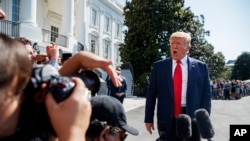ການເຈລະຈາທາງດ້ານການຄ້າຮອບໜ້າ ລະຫວ່າງສະຫະລັດກັບຈີນ ອາດຈະບໍ່ມີຂຶ້ນເລີຍ ອີງຕາມຄຳເວົ້າຂອງປະທານາທິບໍດີດໍໂນລ ທຣຳ ກ່າວຕໍ່ພວກນັກຂ່າວໃນວັນສຸກວານນີ້.
ເມື່ອວີໂອເອຖາມວ່າ ທ່ານຈະຍົກເລີກການເຈລະຈາ ທີ່ຈະຈັດຂຶ້ນຢູ່ວໍຊິງຕັນຫຼືບໍ່? ປະທານາທິບໍດີທຣຳກ່າວຕອບວ່າ “ບາງທີ” ໂດຍຮັບຮູ້ວ່າ ການເຈລະຈາໄດ້ກຳນົດໃສ່ເດືອນໜ້າ “ແຕ່ຈະມີການຍົກເລີກຫຼືບໍ່ນັ້ນ ພວກເຮົາຕ້ອງໄດ້ລໍຖ້າເບິ່ງກ່ອນ.”
ປະທານາທິບໍດີໄດ້ເລີ້ມການຕອບຄຳຖາມເປັນເວລາ 30 ນາທີຂອງພວກນັກຂ່າວ ທີ່ເດີ່ນກ້ຳໃຕ້ຂອງທຳນຽບຂາວ ໂດຍປະກາດວ່າ “ພວກເຮົາຍັງບໍ່ທັນພ້ອມເທື່ອທີ່ຈະເຮັດຂໍ້ຕົກລົງ” ກັບຈີນ ທ່າມກາງທີ່ສົງຄາມການຄ້າ ພວມທະວີຄວາມຮ້າຍແຮງຂຶ້ນ ຫຼັງຈາກການເຈລະຈາໃນຮອບທີ່ແລ້ວຢູ່ນະຄອນຊຽງໄຮ້ ໄດ້ແຕກຫັກລົງເມື່ອອາທິດທີ່ຜ່ານມາ. ປະທານາທິບໍດີທຣຳ ໄດ້ກ່າວເຖິງການເກັບພາສີແບບລົງໂທດສອງຮອບຕໍ່ຈີນນັ້ນວ່າ “ພວກເຮົາບໍ່ມີທາງເລືອກ ນອກຈາກເຮັດໃນສິ່ງທີ່ພວກເຮົາກຳລັງເຮັດຢູ່.”
ທ່ານທຣຳ ກ່າວກ່ຽວກັບຈີນວ່າ “ໃນເວລານີ້ ພວກເຂົາກຳລັງປະສົບກັບປີທີ່ຮ້າຍແຮງສຸດ ທີ່ພວກເຂົາມີໃນຮອບຫຼາຍໆປີ” ແລະທ່ານກ່າວຕື່ມວ່າ “ພວກເຮົາມີໄພ້ທັງໝົດຢູ່ໃນມື.”
ເມື່ອມີການຖາມທ່ານທຣຳ ກ່ຽວກັບລາຍງານຂ່າວທີ່ວ່າ ລັດຖະບານຂອງທ່ານຈະເລື່ອນເວລາໃນການອອກໃບອະນຸຍາດໃຫ້ແກ່ບໍລິສັດອາເມຣິກາ ເພື່ອເລີ້ມຂາຍສິນຄ້າຕ່າງໆໃຫ້ບໍລິສັດໂທລະຄົມມະນາຄົມຍັກໃຫຍ່ ຫົວເຫວີຍ ຂອງຈີນນັ້ນ ປະທານາທິບໍດີຕອບວ່າ “ພວກເຮົາບໍ່ເຮັດທຸລະກິດກັບຫົວເຫວີຍ” ແຕ່ນັ້ນອາດຈະມີການປ່ຽນແປງ ຖ້າຫາກວ່າມີຂໍ້ຕົກລົງກັນທາງດ້ານການຄ້າ.
ລັດຖະບານທ່ານທຣຳ ເມື່ອເດືອນພຶດສະພາຜ່ານມາ ໄດ້ຈັດເອົາຫົວເຫວີຍເຂົ້າໄວ້ໃນບັນຊີດຳໂດຍກ່າວຫາບໍລິສັດດັງກ່າວວ່າ ມີຄວາມສຳພັນຢ່າງແໜ້ນແຟ້ນກັບກອງທັບຈີນ ຍ້ອນຄວາມເປັນຫ່ວງທາງດ້ານຄວາມໝັ້ນຄົງ ຈຶ່ງຫ້າມບໍ່ໃຫ້ບໍລັດສັດດັ່ງກ່າວ ຊື້ແຜງວົງຈອນເຊມີຄອນດັກເຕີ້ ທີ່ຜະລິດຢູ່ໃນສະຫະລັດ. ແຕ່ໃນເດືອນແລ້ວ ທ່ານທຣຳໄດ້ຕົກລົງທີ່ຈະໃຫ້ເວລາໃນການຕັດສິນໃຈເພື່ອອອກໃບອະນຸຍາດ ໃຫ້ບໍລິສັດອາເມຣິກັນ ເຊັ່ນ Broadcom ແລະ Google ຂາຍອຸບປະກອນໃຫ້ແກ່ຫົວເຫວີຍໄດ້.
ການເຄື່ອນໄຫວທີ່ຈະເລື່ອນເວລາໃນການອອກໃບອະນຸຍາດດັ່ງກ່າວ ມີຂຶ້ນຫຼັງຈາກປັກກິ່ງປະກາດວ່າ ຕົນຈະຢຸດເຊົາການຊື້ຜະລິດຕະພັນກະເສດຕະກຳຂອງອາເມຣິກັນເພື່ອເປັນການຕອບໂຕ້ຕໍ່ການເກັບພາສີຮອບໃໝ່ຂອງທ່ານທຣຳ. ນອກນັ້ນ ປັກກິ່ງຍັງໄດ້ອະນຸຍາດໃຫ້ເງິນຕາຂອງຕົນ ຫຼຸດລາຄາລົງໃນການແລກປ່ຽນກັບເງິນໂດລາ ສູ່ລະດັບທີ່ບໍ່ເຄີຍເຫັນມາກ່ອນ ໃນຮອບທົດສະວັດກວ່າໆ.
The next round of trade talks between the United States and China might not happen, President Donald Trump told reporters Friday.
Asked by VOA if he would cancel the talks scheduled to be held in Washington, Trump replied, "Maybe," acknowledging the discussions are set for next month but "whether or not they're canceled, we'll see."
The president began a 30-minute question-and-answer session with journalists on the White House South Lawn by declaring, "We're not ready to make a deal" with China amid an escalating trade war, after the previous round of talks broke down in Shanghai last week.
"We have no choice but to do what we're doing," Trump said of two rounds of punitive tariffs he has imposed on China.
"As of this moment, they're having the worst year they've had in many, many years," he said of China.
"We have all the cards," he added.
Trump was asked about reports his administration is going to delay granting licenses for American companies to restart sales to Chinese telecommunications giant Huawei. The president replied, "We're not doing business with Huawei," but that could change if there is a trade deal.
The Trump administration, in May, blacklisted Huawei, alleged to have deep ties to China's military, for national security concerns, preventing it from buying semiconductor chips made in the United States. But Trump last month agreed to give "timely license decisions," to allow companies such as Broadcom and Google to sell to Huawei.
The move to delay issuing those licenses came after Beijing announced it is halting the purchasing of American agricultural products in retaliation for Trump's new round of threatened tariffs. Beijing also allowed its currency to drop against the dollar to a level not seen in more than a decade.
A number of economists warn the trade war between the world's two biggest economic powers could hurt growth globally, in part due to disruption of supply chains and less efficient production.
The International Monetary Fund and the World Bank have downgraded their forecasts for economic growth this year.
Trump is calling for a weaker dollar and lower U.S. interest rates. He said on Friday the Federal Reserve should cut them by one percent, and has criticized China's currency moves.
However, he acknowledged to reporters as he departed the White House that the drop in the value of the yuan appears to be keeping the price of some Chinese exports from rising.
Trump has repeatedly promised that American consumers will not pay more for key goods and that the country's farmers, who sell the Chinese soybeans, pork and other agricultural products, will not be hurt by the trade war.





